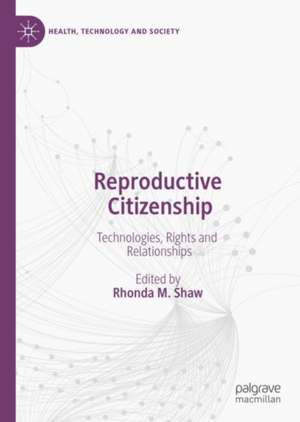Reproductive Citizenship: Technologies, Rights and Relationships: Health, Technology and Society
Editat de Rhonda M. Shawen Limba Engleză Hardback – 24 iun 2022
| Toate formatele și edițiile | Preț | Express |
|---|---|---|
| Paperback (1) | 781.45 lei 6-8 săpt. | |
| Springer Nature Singapore – 25 iun 2023 | 781.45 lei 6-8 săpt. | |
| Hardback (1) | 786.66 lei 6-8 săpt. | |
| Springer Nature Singapore – 24 iun 2022 | 786.66 lei 6-8 săpt. |
Din seria Health, Technology and Society
-
 Preț: 280.10 lei
Preț: 280.10 lei - 5%
 Preț: 716.09 lei
Preț: 716.09 lei - 5%
 Preț: 841.37 lei
Preț: 841.37 lei - 18%
 Preț: 895.58 lei
Preț: 895.58 lei - 15%
 Preț: 642.51 lei
Preț: 642.51 lei - 18%
 Preț: 781.00 lei
Preț: 781.00 lei -
 Preț: 385.84 lei
Preț: 385.84 lei -
 Preț: 391.22 lei
Preț: 391.22 lei -
 Preț: 423.84 lei
Preț: 423.84 lei -
 Preț: 390.46 lei
Preț: 390.46 lei - 5%
 Preț: 458.23 lei
Preț: 458.23 lei - 5%
 Preț: 719.19 lei
Preț: 719.19 lei - 15%
 Preț: 584.92 lei
Preț: 584.92 lei - 5%
 Preț: 372.97 lei
Preț: 372.97 lei - 5%
 Preț: 717.00 lei
Preț: 717.00 lei - 15%
 Preț: 639.73 lei
Preț: 639.73 lei - 15%
 Preț: 640.24 lei
Preț: 640.24 lei -
 Preț: 392.60 lei
Preț: 392.60 lei - 15%
 Preț: 640.88 lei
Preț: 640.88 lei -
 Preț: 388.13 lei
Preț: 388.13 lei - 5%
 Preț: 725.96 lei
Preț: 725.96 lei - 5%
 Preț: 462.63 lei
Preț: 462.63 lei -
 Preț: 389.88 lei
Preț: 389.88 lei -
 Preț: 387.75 lei
Preț: 387.75 lei - 15%
 Preț: 635.80 lei
Preț: 635.80 lei - 18%
 Preț: 786.36 lei
Preț: 786.36 lei - 5%
 Preț: 370.38 lei
Preț: 370.38 lei - 15%
 Preț: 641.71 lei
Preț: 641.71 lei - 5%
 Preț: 368.37 lei
Preț: 368.37 lei - 5%
 Preț: 366.56 lei
Preț: 366.56 lei -
 Preț: 384.86 lei
Preț: 384.86 lei
Preț: 786.66 lei
Preț vechi: 959.34 lei
-18% Nou
Puncte Express: 1180
Preț estimativ în valută:
150.52€ • 157.16$ • 124.58£
150.52€ • 157.16$ • 124.58£
Carte tipărită la comandă
Livrare economică 04-18 aprilie
Preluare comenzi: 021 569.72.76
Specificații
ISBN-13: 9789811694509
ISBN-10: 9811694508
Pagini: 337
Ilustrații: XVI, 337 p.
Dimensiuni: 148 x 210 mm
Greutate: 0.58 kg
Ediția:1st ed. 2022
Editura: Springer Nature Singapore
Colecția Palgrave Macmillan
Seria Health, Technology and Society
Locul publicării:Singapore, Singapore
ISBN-10: 9811694508
Pagini: 337
Ilustrații: XVI, 337 p.
Dimensiuni: 148 x 210 mm
Greutate: 0.58 kg
Ediția:1st ed. 2022
Editura: Springer Nature Singapore
Colecția Palgrave Macmillan
Seria Health, Technology and Society
Locul publicării:Singapore, Singapore
Cuprins
Chapter 1: Reproductive citizenship and meanings of infertility.- Chapter 2: Affective animacy and temporalities in Danish women’s accounts of cryopreserved embryos.- Chapter 3: The affective temporalities of ovarian tissue freezing: Hopes, fears, and the folding of embodied time in medical fertility preservation.- Chapter 4: Trans narratives of fertility preservation: Constructing experiential expertise through YouTube Vlogs.- Chapter 5: Fertility and fragility: Social egg freezing and the ‘potentially maternal’ subject.- Chapter 6: Reproduction and beyond: Imaginaries of uterus transplantation in the light of embodied histories of living life without a uterus.- Chapter 7: Sized out: Fatness, fertility care, and reproductive justice in Aotearoa New Zealand.- Chapter 8: The experience of Single Mothers by Choice making early contact with open-identity or private sperm donors and/or donor sibling families in New Zealand.- Chapter 9: The importance of a genetic link in surrogacy arrangements: Law, public opinion, and reconciling conflict.- Chapter 10: Surrogacy and the informal rulebook for making kin through assisted reproduction in Aotearoa New Zealand.- Chapter 11: Constructing gay fatherhood in known donor-lesbian reproduction: ‘We get to live that life, we get to be parents’.- Chapter 12: Doing reflexivity in research on donor conception: Examining moments of bonding and becoming.- Chapter 13: Reproductive choices and experiences in planning for parenthood and managing infertility.
Notă biografică
Rhonda M. Shaw is an Associate Professor in the School of Social and Cultural Studies at Te Herenga Waka / Victoria University of Wellington, New Zealand. Her research interests include the sociology of morality and ethics, family life and intimate relationships, and empirical research on the donation and provision of human biological materials and services. Rhonda is the editor of Bioethics Beyond Altruism: Donating and Transforming Human Biological Materials (2017).
Textul de pe ultima copertă
This book addresses responses to the predicament of medical and social infertility. It draws on international research to examine the dimensions of reproductive citizenship in relation to decision-making about a range of issues: from fertility preservation and the desirability of family creation as a normative expectation of social participation, to how families manage and negotiate engagement with providers of reproductive materials and services around information disclosure and contact, and how they consider their social obligations and responsibilities in relation to the use of assisted reproductive technology (ART).
Rhonda M. Shaw is an Associate Professor in the School of Social and Cultural Studies at Te Herenga Waka / Victoria University of Wellington, New Zealand. Her research interests include the sociology of morality and ethics, family life and intimate relationships, and empirical research on the donation and provision of human biological materials and services. Rhonda is the editor of Bioethics Beyond Altruism: Donating and Transforming Human Biological Materials (2017).
Caracteristici
Brings together new research on the social, cultural, economic, and ethical dimensions of assisted human reproduction Draws exclusively on qualitative social science and humanities research intersecting with reproductive technologies Keeps researchers and scholars abreast of discourses of social, structural, and medical infertility
